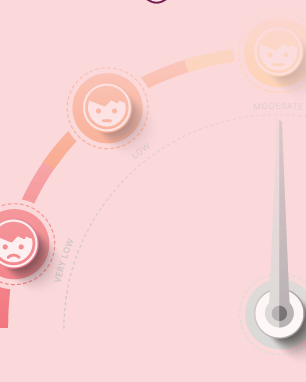How’m I Doing?
There’s nothing as unself-conscious as a small child. This, I think, is the whole essence of her charm. She sees the world from the inside out, with no thought at all for how others see her.
Her actions and speech are wholly devoid of the action-reaction calculations that we soon learn to make as we advance our way through the world. In other words, there’s none of the anxious, “If I do this, or don’t do that, will it recommend me to other people or alienate them?” The very young child lives in the moment, going on the blithe assumption that she belongs, that she is beloved, that all is well. Her primary concern is “How do I like this?” and not “Do they like me?”
All too soon, the formula changes. When the first unconditional acceptance of babyhood gives way to the age of chinuch, the child soon learns to read her parents’ and teachers’ expressions for clues as to how she’s doing. Mommy’s smile means that I’m okay. If Morah is frowning, I messed up. Her father’s praise is worth millions in terms of her budding self-image. Her view of herself has become inextricably bound up with the opinions of the important “others” in her life.
But it doesn’t stop there. As the child grows older, the opinions of her peers begin to take on even more importance. Pre-teen through adolescence, especially, is one long agony of trying to get it just right with her group of friends in particular, and her social stratum in general. It’s as if she feels she’s being graded all the time on a report card of social acceptability.
This hardly abates as we move into adulthood. As we grow into ourselves, we continue to care a great deal about how others view us. Each new encounter, each attempted accomplishment, each demonstration of our taste and our talent and our capabilities, leaves us groping for an answer to the all-important question: “How’m I doing?”
Am I a successful human being or a deficient one? That is the question that determines the level of self-esteem, or lack of it, that a person takes with her through life.
It’s a question that rests largely on how others regard us. And with good reason. As Pirkei Avos teaches us: If the spirit of one’s fellows is pleased with him, the spirit of the Omnipresent is pleased with him… and vice versa (Avos 3:13). There’s nothing like the opinion of your fellow man to tell you how you’re doing. If people cross the street at the sight of you, you can be pretty sure you’re doing something wrong.
Yet, people don’t always get it right. Through ignorance of the facts, the blindness of self-interest, or prejudices of their own, they may have reactions that are not based on emes. They may embrace someone who is unworthy and reject the worthiest among us.
How can I tell the difference? How do I know when society’s opinion reflects a true deficiency that I must work on, and when it does not?
The answer is that each of us is obligated to hone and refine our inner truth meters. Part of what it means to be human is to be able to examine what others think of us and decide what is valid and what can be discarded.
For example, suppose someone were to come up to me and compliment a piece that I’ve written which I, personally, feel is under par. There is an urge to bask in the praise. Being praised feels good. But if I know, deep down, that that particular piece was not worthy of such praise, I can’t accept the compliment with complaisance. In fact, even hearing it would make me feel uncomfortable.
Unfortunately, there are many ways to avoid this kind of discomfort. Many social groups constantly build themselves and each other up by assuring each other, and themselves, that they are wonderful—even if the reality is far otherwise. One way to build a positive self-image is to simply block out any and all negative input. If I surround myself exclusively with people who tell me I’m great, then I’ll feel great… As long as I don’t crane my neck to look past their shoulders at the large segment of humanity that may not agree. Or perk an attentive ear inward, to hear what the voice of emes is trying to tell me.
We can use all sorts of tricks to fool our internal truth meter. By focusing only on what builds us up in our own estimation, and looking away from what makes us feel bad, we can deceive ourselves into thinking that we deserve better “marks” than we’ve actually earned. For instance, if I’m great at my job but awful on the home front, the temptation is great to measure my success only by the workplace yardstick and avert my eyes from my deficiencies at home. I can let the people who know me at work pat me on the back and build me up, while relegating those closer to me, who may have reason to be unhappy, to the category of those whose opinions don’t matter as much.
The ego can perform all sorts of acrobatics to avoid being dampened or deflated. Even if both the outside world and your closest circle are critical, you can simply choose to ignore their criticism. You do this by classifying it as mean-spirited, misguided, or driven by envy. Then, having relegated all negative opinions to the trash bin where you’ve convinced yourself that they belong, you can go your merry way with your self-image intact.
The problem is that the little voice of truth inside us can’t be silenced forever. Call it your conscience. Call it your neshomah. There’s something inside every person that is wedded to the emes. It may take a steam shovel to force you to confront it. Sometimes it takes a mere feather touch. But one way or another, across the span of a person’s lifetime, the truth will come out.
There are three partners in creating a person: the mother, the father, and Hashem. And there are two partners in creating a person’s self-image: the outside world, and the voice of truth that lives inside us. Neither one can be dispensed with. The reactions of the people around us are often, though not always, an accurate gauge of how we’re doing. But without touching base with the barometer of emes that lives on the inside, the full picture will continue to elude us.
In our eagerness to feel good about ourselves, it can be all too easy to fall into the error of surrounding ourselves with carbon copies of ourselves, people who share our deficiencies and won’t help us grow past them. Conversely, it’s just as easy to discount the opinions of others if we don’t want to hear them. What we have to do, it seems to me, is acknowledge people’s views without giving them too much power.
There will be many, many voices talking at us as we go through our lives. Some of them will say one thing, and some will say another. At the end of the day, it’s the voice of truth inside us that is ultimately our best friend. A friend that can show us where we’ve gone wrong. And a friend that can help us fix it.
IN A PERFECT WORLD
Libby Lazewnik
How’m I Doing?
There’s nothing as unself-conscious as a small child. This, I think, is the whole essence of her charm. She sees the world from the inside out, with no thought at all for how others see her.
Her actions and speech are wholly devoid of the action-reaction calculations that we soon learn to make as we advance our way through the world. In other words, there’s none of the anxious, “If I do this, or don’t do that, will it recommend me to other people or alienate them?” The very young child lives in the moment, going on the blithe assumption that she belongs, that she is beloved, that all is well. Her primary concern is “How do I like this?” and not “Do they like me?”
All too soon, the formula changes. When the first unconditional acceptance of babyhood gives way to the age of chinuch, the child soon learns to read her parents’ and teachers’ expressions for clues as to how she’s doing. Mommy’s smile means that I’m okay. If Morah is frowning, I messed up. Her father’s praise is worth millions in terms of her budding self-image. Her view of herself has become inextricably bound up with the opinions of the important “others” in her life.
But it doesn’t stop there. As the child grows older, the opinions of her peers begin to take on even more importance. Pre-teen through adolescence, especially, is one long agony of trying to get it just right with her group of friends in particular, and her social stratum in general. It’s as if she feels she’s being graded all the time on a report card of social acceptability.
This hardly abates as we move into adulthood. As we grow into ourselves, we continue to care a great deal about how others view us. Each new encounter, each attempted accomplishment, each demonstration of our taste and our talent and our capabilities, leaves us groping for an answer to the all-important question: “How’m I doing?”
Am I a successful human being or a deficient one? That is the question that determines the level of self-esteem, or lack of it, that a person takes with her through life.
It’s a question that rests largely on how others regard us. And with good reason. As Pirkei Avos teaches us: If the spirit of one’s fellows is pleased with him, the spirit of the Omnipresent is pleased with him… and vice versa (Avos 3:13). There’s nothing like the opinion of your fellow man to tell you how you’re doing. If people cross the street at the sight of you, you can be pretty sure you’re doing something wrong.
Yet, people don’t always get it right. Through ignorance of the facts, the blindness of self-interest, or prejudices of their own, they may have reactions that are not based on emes. They may embrace someone who is unworthy and reject the worthiest among us.
How can I tell the difference? How do I know when society’s opinion reflects a true deficiency that I must work on, and when it does not?
The answer is that each of us is obligated to hone and refine our inner truth meters. Part of what it means to be human is to be able to examine what others think of us and decide what is valid and what can be discarded.
For example, suppose someone were to come up to me and compliment a piece that I’ve written which I, personally, feel is under par. There is an urge to bask in the praise. Being praised feels good. But if I know, deep down, that that particular piece was not worthy of such praise, I can’t accept the compliment with complaisance. In fact, even hearing it would make me feel uncomfortable.
Unfortunately, there are many ways to avoid this kind of discomfort. Many social groups constantly build themselves and each other up by assuring each other, and themselves, that they are wonderful—even if the reality is far otherwise. One way to build a positive self-image is to simply block out any and all negative input. If I surround myself exclusively with people who tell me I’m great, then I’ll feel great… As long as I don’t crane my neck to look past their shoulders at the large segment of humanity that may not agree. Or perk an attentive ear inward, to hear what the voice of emes is trying to tell me.
We can use all sorts of tricks to fool our internal truth meter. By focusing only on what builds us up in our own estimation, and looking away from what makes us feel bad, we can deceive ourselves into thinking that we deserve better “marks” than we’ve actually earned. For instance, if I’m great at my job but awful on the home front, the temptation is great to measure my success only by the workplace yardstick and avert my eyes from my deficiencies at home. I can let the people who know me at work pat me on the back and build me up, while relegating those closer to me, who may have reason to be unhappy, to the category of those whose opinions don’t matter as much.
The ego can perform all sorts of acrobatics to avoid being dampened or deflated. Even if both the outside world and your closest circle are critical, you can simply choose to ignore their criticism. You do this by classifying it as mean-spirited, misguided, or driven by envy. Then, having relegated all negative opinions to the trash bin where you’ve convinced yourself that they belong, you can go your merry way with your self-image intact.
The problem is that the little voice of truth inside us can’t be silenced forever. Call it your conscience. Call it your neshomah. There’s something inside every person that is wedded to the emes. It may take a steam shovel to force you to confront it. Sometimes it takes a mere feather touch. But one way or another, across the span of a person’s lifetime, the truth will come out.
There are three partners in creating a person: the mother, the father, and Hashem. And there are two partners in creating a person’s self-image: the outside world, and the voice of truth that lives inside us. Neither one can be dispensed with. The reactions of the people around us are often, though not always, an accurate gauge of how we’re doing. But without touching base with the barometer of emes that lives on the inside, the full picture will continue to elude us.
In our eagerness to feel good about ourselves, it can be all too easy to fall into the error of surrounding ourselves with carbon copies of ourselves, people who share our deficiencies and won’t help us grow past them. Conversely, it’s just as easy to discount the opinions of others if we don’t want to hear them. What we have to do, it seems to me, is acknowledge people’s views without giving them too much power.
There will be many, many voices talking at us as we go through our lives. Some of them will say one thing, and some will say another. At the end of the day, it’s the voice of truth inside us that is ultimately our best friend. A friend that can show us where we’ve gone wrong. And a friend that can help us fix it.







